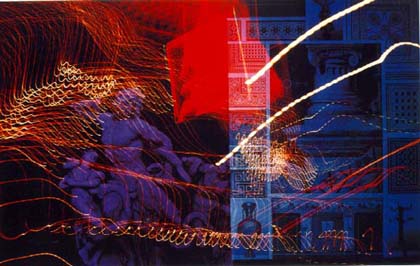--Introductory Screenwriting
Professor Julia Evergreen Keefer

Required Texts: Carving Your Story by Dr. Julia Keefer. Optional books recommended.
COURSE OBJECTIVES:To introduce you to the craft and art of screenwriting, classical dramaturgy, Hollywood paradigms, global mythology, and cutting edge concepts so that you can begin writing YOUR full length screenplay. To develop 1) skills of critical analysis; 2) oral and extemporaneous skills needed to pitch a treatment and work collaboratively; and most importantly, 3) skills that awaken imagination, originality and inventiveness in the dramatic medium to help you write a screenplay.
Goals: We will spend the first half of the semester learning the basics of format in Final Draft in the writing lab, and the second half acting out your scripts with scene study. In this introductory class, it is unlikely you will have the time to finish a 120 page professional script. But you will develop a story idea, practice writing scenes in screenplay format, learn how to open a script, create a world, introduce characters, set up inciting incidents, ask and answer dramatic questions, and connect the crisis/climax/resolution to the inciting incident. At the end of this course, you will be ready for Screenwriting II, when you can write a complete script. Once you understand the basics, you are encouraged to break any rules you like (artistic licence) for the good of your script, and work in media other than the traditional Hollywood paradigms. But before you rebel, it's important to understand what you are rebelling against.
COURSE REQUIREMENTS: Attendance and punctuality
are critical as we will cover a lot of material at breakneck speed and
you must keep your wits and wit about you. You will be graded pass/fail
each week on your FD scene format, a letter grade for oral presentations,
numerically for your midterm on dramaturgy, and then pass/fail on scene
study and finally a letter grade for your 50 page script. Remember that
you are not on the kinds of ideas you have (no one can judge them in a "free" world)
but on the thoroughness, depth, energy and commitment you give to your
work. You will be graded on your ability to work alone with discipline,
as well as your ability to listen to and contribute to the group, as both
skills are needed as a professional screenwriter. The main projects are
as follows:
Your in-class writing and participation
Oral Group Presentations on Chosen Films
Midterm written exam on dramaturgy (texts, class lectures, and Keefer website),
Midterm oral exam on preliminary pitch of your story idea to supportive and
opposing groups,
Writing Assignments: Short scenes on FD the first half of the semester to establish
format and sequencing. Either first 30 and last 20 pages of a full length
screenplay and a query letter featuring your six plot point sentences and
logline, 2 consecutive sitcoms which is about 50 pages double-spaced in
sitcom format, or one 60 page TV drama. All scripts should be formatted
through Final Draft software. Let me know at the beginning of the semester
if we have a separate TV group or whether everyone wants to write features.
Professor Evergreen Keefer
Office Hours: CSB34: Meatspace:Thursday 9:20-11:20 p.m. Cyberspace: julia.keefer@nyu.edu.
Office hours are NOT to repeat what happened in class when you were absent.
If you are absent, it is your responsibility to make up the material by following
the syllabus with your group's help. It is not my job to repeat lectures but
to clarify them in office hours and more importantly, to help you with individual
projects, competitions, problems and questions. However the class is structured
as a workshop and it is best if you ask as many questions as possible there
so that the whole group benefits. We will organize a group listserv which
should field most of the questions and allow for brainstorming and role playing
as well. Although I will always be in my office at the scheduled time, it
is best to make appointments so that you aren't kept waiting unnecessarily.
Screenwriting versus Personal Writing
The Biological Rhythms of Drama

Course Breakdown: Consult syllabus at least once
a week throughout semester for changes. Use class listserv
to ask questions, make complaints and brainstorm story ideas. Some of the lectures will be online.
January 24: Introductory lecture on course objectives and requirements, a synopsis
of the four texts. Write a scene in Final Draft. Begin work on Brainstorming
Document. Break into groups to choose films to analyze. Use recent films whenever
possible.
January 31: Lecture on basic screenwriting followed by discussion. Continue discussion in large listserv. Review plot points: II, PP1, Midpoint, PP2, crisis, climax and resolution. Compare this paradigm to Campbell's mythological Special and Ordinary Worlds, and the Euro-existentialist theatre of the absurd. Because screenwriting itself is so structured, and group collaboration can sometimes degenerate into conformity, it is important to find unique ways of expressing yourselves. It's okay to draw on personal experience as long as you can make it dramatic, develop your villains, and create an exciting journey. See Dramatic versus Personal Writing. Submit short scenes on FD for analysis of format. Set Up and Inciting Incident or Call to Adventure. Describe your world in descriptive prose. What are your locations? Start your Treatment Document.
February 7: The Fight Club. Group A film and presentation. Lecture on Crossing the Threshold. Write Plot Point One. Who are your threshold guardians? What is your journey? Who is your antagonist?
February 14: Super Bad. Group B film and presentation. Lecture on Midpoint, character conflict and transformation. Write this scene. (Start your Character Document including short biographies, character transformations, and monologues of main characters and a few pivotal inanimate objects or animals.)
February 21: Babel. Group C film and presentation. Lecture on Plot Point Two. All is lost. Returning to the Ordinary World. Write this scene.
February 28: Muppet Christmas. Group D film and presentation. Lecture on Crisis/Climax/Resolution. Resurrection and the Elixir.
March 6: Hand in query letters with logline, plot points and original selling points. Explain your use of treatment, sets, character and brainstorming documents. Study texts and bring questions to class. Review and preparation for written exam. In-class writing on character workshop.
March 13: Midterm in computer lab. No make-ups. (Industry professionals meet their deadlines.) Leave notebooks outside. Written exam on texts, class lectures and presentations, and Keefer website. Prepare oral pitch of story idea.
For the rest of the semester, we will meet in a classroom for dramatic readings.
March 27: Oral Midterm. Pitch your script, 10 minutes each. You should know your protagonist's objective, chief obstacles, and have six full sentences related to II, PP1, Midpoint, PP2, Crisis/Climax, and Resolution, Ordinary and Special Worlds. Pitch story ideas to a friendly group of executives who want to develop your idea, and then an opposing group you have to CONVINCE to fork out the cash. Bring query letter, 3 bios and longer treatment. Write first 15-30 pages of your script in proper format. Bring copies for all actors. Bring CD or tape recorders.
From now on, plan on writing in every class, and tape your scene study that is read aloud with classmates as your actors. Lectures continue during scene study so come to class on time. We move from the computer lab to a room with a window.
April 3: Act out first thirty pages. Groups A and B.
April 10: Act out first thirty pages. Groups C and D. Write last twenty pages from end of PP2 to crisis, climax, resolution. Bring copies of scripts and tape recorders.
April 17: Act out last twenty pages. Groups A and B.
April 24: Act out last twenty pages. Groups C and D.
May 1: Final Scene Study.
May 8: Submit final scripts with query letters and self-evaluations. No extensions or incompletes.
Optional Reading List
TOOLS OF SCREENWRITING by Mabley and Howard
SCREENWRITING UPDATED by Linda Aronson
SCREENPLAY by Syd Field
MYTH AND THE MOVIES by Stuart Voytilla
THE WRITER'S JOURNEY by Christopher Vogler
Genre books by Neill Hicks
STORY by Robert McKee
THE SCREENWRITER WITHIN by D.B. Gilles
MAKING A GOOD SCRIPT GREAT by Linda Seger